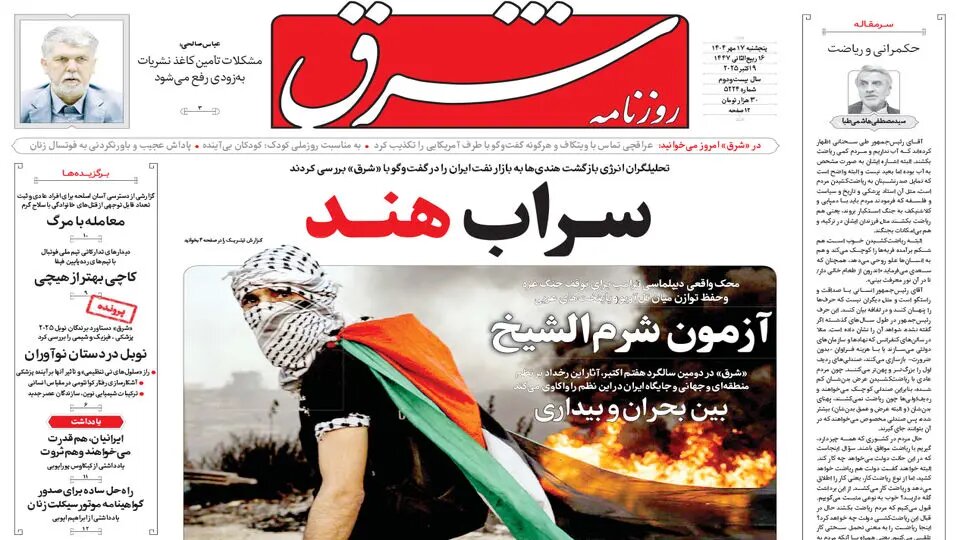‘Judicial overreach’ and ‘economic terrorism’

TEHRAN - Shargh, in an editorial, addressed the U.S. sanctions imposed on 29 entities linked to Iran across different countries, writing: On Thursday, the United States government announced that it had added 29 entities (including 26 companies) to the U.S. Department of Commerce’s restricted list.
This move specifically targets companies involved in purchasing American electronic components used in armed drones. These sanctions are often justified as alternative tools to warfare for advancing U.S. foreign policy, but they have faced strong criticism from various countries. China describes these sanctions as “judicial overreach” due to their interference in international trade, while Iran refers to them as “economic terrorism” and a “violation of human rights.” Turkey, which maintains close economic ties with Iran, views secondary sanctions as “extraterritorial” and a threat to national sovereignty.
Farhikhtegan: October 7 set fire to American plan
Farhikhtegan wrote due to its global influence over energy production and distribution, and its role in expanding religious power within the Islamic world, Iran was placed as a top priority for confrontation and containment. Eliminating Iran and gaining access to energy resources would easily compensate for the costs of Middle East wars and maintain America’s position at the top of the global economy. The October 7 operation inflicted a heavy and irreparable cost on the enemy; however, the main plan (Iran’s collapse) remained on the agenda. Yet the result led to increased discredit and isolation of the Zionist criminal network globally. Some Arab leaders in the region, under pressure from Muslim public opinion, were unable to join the Abraham Accords. The survival of the American-led international order depends on the expansion of the Zionist regime and the fragmentation of Iran. The war was designed to save the American empire and dismantle Iran, but Palestinian resistance on October 7 destroyed that plan. The alliance of non-Western countries in this existential war in West Asia holds strategic importance, potentially shaping the fate of the region for at least a century. Resistance is the key to victory in this historic battle, and from its depths, a new Iran will be born.
Hamshahri: A direct warning to US
In an analysis, Hamshahri addressed reports of U.S. preparation to obstruct or interfere with the movement of Iranian commercial vessels. According to Al Mayadeen news network, signs have emerged indicating that the United States is preparing to disrupt Iranian shipping under the pretext of enforcing sanctions (following the restoration of the UN Security Council sanctions by the European trio of Britain, France and Germany). Iran’s model of tanker warfare during the Sacred Defense era (in the 1980s) is seizure against seizure, including recalling ambassadors and political representatives, and reliance on internationally recognized legal frameworks. The historical record of such confrontations casts doubt on any certainty of Western victory. Disrupting Iran’s maritime trade is no simple matter. Approximately 40% of the world’s oil passes through a corridor over which Iran maintains full control and oversight, even in the face of the U.S. Navy. The modern world is defined by complexity, and Iran’s experience during the 12-day war in June has forged a national will stronger than ever. Testing this will have a huge cost, more than the cost of oil that passes through the Strait of Hormuz daily!
Sazandegi: Unsubstantiated claim
In a recent article, Sazandegi refuted a claim by the Kuwaiti newspaper Al-Jarida, which alleged direct contact between Iranian and American officials. Amid heightened tensions in the Middle East—driven by the Gaza conflict and developments surrounding Iran’s nuclear program—Al-Jarida published a controversial report claiming direct communication between Tehran and Washington. Despite the denial by Iranian Foreign Minister Abbas Araghchi, the report quickly circulated across various media outlets and social networks, once again highlighting the shortcomings of some domestic sources in verifying news and assessing the credibility of information. Analysts believe that these words are mostly propagandistic and symbolic intended to demonstrate America's prowess. Tehran’s documented and unequivocal response indicates that Iran will not alter its strategic course under media or political pressure and that the country remains committed to negotiation and diplomacy. This approach reflects Iran’s adherence to national security principles, international law, and the importance of resolving disputes through dialogue, not through threats and tension.
Leave a Comment